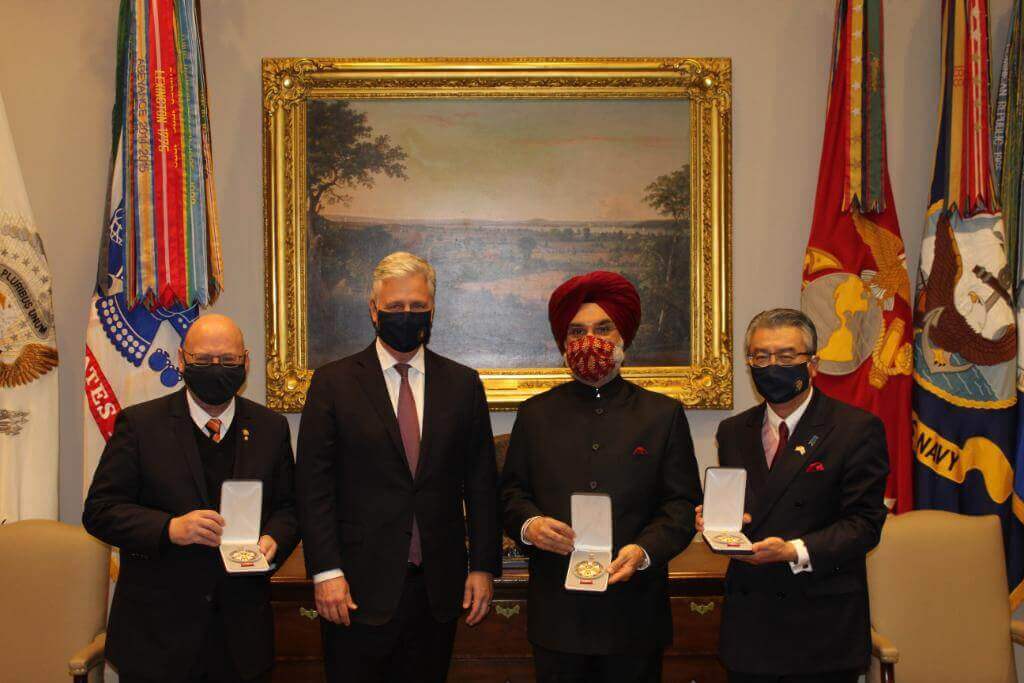United States (US) President Donald Trump conferred Indian Prime Minister (PM) Narendra Modi, Australian PM Scott Morrison, and former Japanese PM Shinzo Abe with the Legion of Merit, which represents one of the highest military honours.
US National Security Adviser Robert O’Brien presented the award to India’s ambassador to the US, Taranjit Singh Sandhu, who accepted the award on behalf of the Indian leader at the White House. O’Brien tweeted that the accolade recognised PM Modi for his “leadership in elevating the US-India strategic partnership”. In response, Modi said he was “deeply honoured” to receive the prize, tweeting that it “recognises the efforts of the people of India & the US to improve bilateral ties, reflected in the bipartisan consensus in both countries about the Indo-US Strategic Partnership”.
He added, “The 21st century presents both unprecedented challenges as well as opportunities. The India-US relationship can leverage the vast potential of our people’s unique strengths to provide global leadership for the benefit of entire humanity,” and went on to say, “firm conviction and commitment to continue working with the US government, and all other stakeholders in both countries, for further strengthening India-US ties.”
Following Donald Trump’s visit to India in February, the two countries pledged to elevate their strategic partnership to a comprehensive global strategic partnership. This was accompanied by a commitment to “deepen” their defence and security partnership. The US has also backed India’s bid for a permanent United Nations Security Council (UNSC) seat, and Trump has called for the expansion of the G7 to include India. India and the US also recently signed a geospatial cooperation agreement during Secretary of State Mike Pompeo’s visit to New Delhi in October.
Similarly, the award for the Australian PM was accepted by Canberra’s ambassador to Washington, Arthur Sinodinos. NSA O’Brien tweeted that Morrison was presented with the award to reflect his “leadership in addressing global challenges and promoting collective security”. Ambassador Sinodinos took to twitter to say that he was “honoured” to receive the award on Morrison’s behalf.
The Morrison government has been a steadfast supporter of the Trump administration, particularly with regards to opposing China’s actions in the South China Sea, Xinjiang, Taiwan, and Hong Kong. Canberra has also openly questioned Beijing’s complicity in the spread of the coronavirus. As a result, the US and Australia agreed to expand military cooperation in the South China Sea during a visit by Australian Defence Minister Linda Reynolds and Foreign Minister Marise Payne to Washington in July.
Likewise, Abe’s prize was accepted by Japan’s Ambassador to the US, Shinsuke Sugiyama. Abe stepped down from his post in September due to health complications and handed over the reins to Yoshihide Suga. Abe was honoured for his “leadership and vision for a free and open Indo-Pacific”.
In August, the new US Ambassador to Japan, Kenneth Weinstein, emphasised that Tokyo should play a more significant role in the alliance, especially in light of China’s increasing assertiveness. The two countries share long-standing defence ties, with 28,500 American troops stationed on Japanese soil.
These awards come on the heels of the recent joint naval exercises by the US, India, Australia, and Japan. The four countries form what is called the Quadrilateral Security Dialogue, or the Quad, which is an informal strategic forum that seeks to challenge Chinese dominance in the Indo-Pacific region.
In October, the foreign ministers of India, Australia, Japan, and the US met in Tokyo for a meeting to discuss post-pandemic international order and ways to achieve a “free, open, and inclusive Indo-Pacific.” And then in November, the four countries took part in the Malabar naval exercises off the coast of Vishakhapatnam in the Bay of Bengal. It was the first time in 13 years that the four countries had come together to participate in the drills; the last time that Australia was part of the exercise in 2007.
The four countries have also boosted their bilateral engagements with one another. For instance, Australia has elevated its relationship with India from a Strategic Partnership to a Comprehensive Strategic Partnership (CSP). In early June, PM Narendra Modi inked nine agreements with PM Scott Morrison, including a Shared Vision for Maritime Cooperation in the Indo-Pacific” and a Mutual Logistics Support Agreement (MLSA). In fact, it was India who invited Australia to participate in the recent Malabar exercises.
Australia also recently signed a military pact with Japan that provides legal status to troops of both nations to travel to each other’s countries, conduct joint military exercises and training, and cooperate on humanitarian disaster relief.
Likewise, in June, the navies of India and Japan conducted military exercises in the Indian Ocean to increase the two forces’ interoperability. India also signed a defence supplies and services agreement with Japan in September. According to the agreement, the Indian armed forces and Japan’s Self-Defence Forces (JSDF) will facilitate the “reciprocal provision” of logistical support, meaning that closer cooperation will ensue between the two militaries.
Therefore, the latest awards given by Trump to the leaders of fellow Quad members only goes to further cement the burgeoning relations between the four countries.
The Legion of Merit was first introduced in 1942 by former US President Franklin D. Roosevelt, and is designed to honour both American and foreign armed forces, as well as heads of states. Another Indian recipient of the award is Field Marshal K.M. Cariappa who was bestowed with the prize by US President Harry S. Truman in 1949.
Trump Awards Modi, Morrison, Abe With Legion of Merit, Deepening Ties With Quad Members
The award, which represents one of the highest military honours, reflects the growing ties between the four members of the Quadrilateral Security Dialogue.
December 23, 2020

IMAGE SOURCE: NSC(L-R) Australian Ambassador Arthur Sinodinos, US National Security Adviser Robert O’Brien, Indian Ambassador Taranjit Singh Sandhu, and Japanese Ambassador Shinsuke Sugiyama
